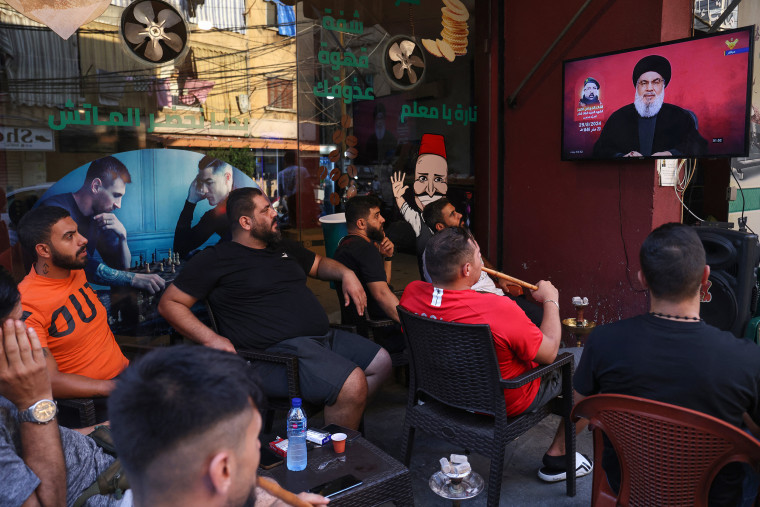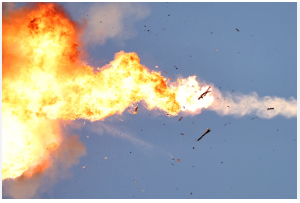An “all-out war” seemed to have been avoided, at least for the time being, despite concerns of a larger regional confrontation provoked by a series of cross-border assaults between Israel and Hezbollah over the weekend.
A tense Middle East awoke on Monday, relieved that all-out war had been averted—at least for the time being. The escalation that had long seemed inevitable occurred in a blaze of cross-border strikes over the weekend.

The heated confrontation that transpired between Israel and Hezbollah came after weeks of warnings that heightened tensions in the area.
Furthermore, the U.S. ally claimed to have undertaken preemptive attacks on southern Lebanon on Sunday after discovering plans for a “large-scale” attack by the extremist group with Iranian support.
Then, Hezbollah unleashed hundreds of missiles and drones, claiming to have struck a military intelligence station close to Tel Aviv as payback for the senior commander’s murder in Beirut last month.
In ten months of simmering strife, it was the heaviest fire that the two sides had exchanged.
However, Israel and Hezbollah promptly conveyed that they were content to stop there, at least for the time being. Tehran celebrated the success of the Hezbollah assault while restating its own promise of “definitive” vengeance against Israel. Washington also expressed its ongoing optimism for efforts to bring about a cease-fire in Gaza.
A former Israeli intelligence officer and negotiator named Avi Melamed shared an analysis with NBC News on Sunday. “The exchange of fire alongside the Israeli-Lebanese border… and the post-strike messages from both Israel and Hezbollah seemingly indicate neither is interested in an all-out war,” Melamed wrote.
According to him, the violence might “bring an end to the anxious period of waiting for rounds of retaliatory strikes that could very well have led to an all-out war” and restore some “calm to the region.”
The intensification coincided with continuing negotiations between Israel and Hamas in Cairo, the capital of Egypt, to broker an agreement that would put a stop to the fighting in Gaza and guarantee the release of hostages that Hamas was holding in the Palestinian enclave.

Although there was no final agreement reached during the high-level discussions in Cairo on Sunday, they are anticipated to continue at lower levels in the coming days in an attempt to bridge any lingering differences. A U.S. official told NBC News that the negotiations “have been constructive and were conducted in a spirit on all sides to reach a final and implementable agreement.”
Hezbollah leader Hassan Nasrallah told Lebanese citizens on Sunday that his organization had postponed responding to commander Fuad Shukr’s murder so that talks could go on and that they had no plans to attack civilian facilities.
Nasrallah declared, “Lebanon can now rest.” But he issued a warning, saying, “We reserve the right to respond” if the operation’s outcomes on Sunday were “not sufficient.”
Hezbollah has previously declared it will stop its strikes on Israel if a cease-fire agreement is reached. According to weapons watchdogs, Hezbollah possesses the greatest missile arsenal of any non-state entity in the world.
Hezbollah’s attack may have seemed more muted, according to Israel Defense Forces spokesperson Nadav Shoshani, because of what Israel has characterized as their preemptive strike, which involved dozens of fighter planes.
Shoshani told NBC News, “That’s part of the reason their attack seemed smaller than what it was and our readiness in our aerial defense systems.”
In the end, Hezbollah claimed to have fired over 320 Katyusha rockets at 11 Israeli military installations and bases.
According to Lebanon’s health ministry, the Israeli attacks resulted in the deaths of at least three persons. Reuters reported that one of the victims was a fighter from the Shi’ite organization Amal, which is associated with Hezbollah.
IDF spokesperson Daniel Hagari stated during a press conference on Sunday that the Israeli military knew of at least six militants who had been killed in the strikes. He added that an Iron Dome interceptor or pieces of interceptor struck the patrol boat he was in, resulting in one IDF soldier dying from his wounds.
To be sure, Sunday’s hostilities were “not the end of the story,” Israeli Prime Minister Benjamin Netanyahu said at the start of a cabinet meeting in Tel Aviv.
Iran has not yet taken action despite vowing to exact its own revenge on Israel for the killings of Ismail Haniyeh, the political leader of Hamas, and Shukr.
Although it has not officially acknowledged culpability for the deaths, Israel—which normally keeps quiet about targeted assassinations—is widely assumed to have carried them out.
Iran’s response, according to the nation’s recently appointed foreign minister Abbas Aragchi, “is definitive and will be measured and calculated” late on Sunday. Additionally, early on Monday, his spokesperson applauded the Hezbollah strike, saying it demonstrated Israel’s lack of “deterrence power.”
Foreign Ministry spokesperson Nasser Kanaani wrote on X that “Israel could not predict the time and place of a limited and managed response by the resistance, despite the comprehensive support of states like the United States.”






